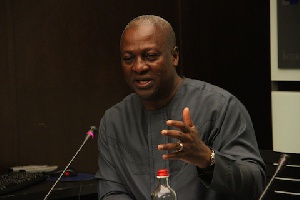Ghana's economy needs to expand by more than eight percent a year to create jobs for its growing population, its president said on Wednesday, a tough challenge for a country battling a fiscal crisis and weaker prices for its commodity exports.
Once Africa's star economy, Ghana has seen growth shrivel in the past two years and is expected to stand at 3.9 percent in 2015, below average for sub-Saharan Africa.
"We want to accelerate the economy so that more people can find jobs both in the formal and informal sectors," President John Mahama said in a radio interview.
"The private sector has to begin to grow to be able to take up the extra jobs that are needed," he said, adding that there was a misalignment between the skills and formal education young people seek and those that businesses actually need.
Ghana, whose population has jumped to 26 million from 19 million in 2000, saw annual economic growth of about eight percent for many years, above average for the continent, helped by its exports of cocoa, oil and gold. But those days are over.
The government aims to tackle its fiscal problems with a three-year International Monetary Fund programme. It is also grappling with frequent power blackouts that have angered voters and have hurt businesses.
Ghana's cedi currency, buffeted by global commodity market woes and increased demand for imports, has lost about 30 percent against the dollar since the start of the year, Thomson Reuters data show.
"We are seeing some stabilisation in the cedi, even though it is still finding its correct level," Mahama said.
Ghana's economic figures for the second quarter of this year will be "much better" than in the first quarter, Mahama said, citing data he has seen which is still to be released.
Ghana's annual consumer price inflation rose to 17.9 percent in July from 17.1 percent the previous month, driven mainly by a government decision to hike petroleum prices by 19 percent, the statistics office said on Wednesday.
Lower rainfall hampered food production during the harvest season, government statistician Philomena Nyarko said
Year-on-year non-food inflation for July stood at 24.6 percent, up from 23.6 percent in June, while the food inflation rate stood at 7.6 percent, up from 7.4 percent the previous month, Nyarko said. The monthly rate was 2.3 percent.
In a revised 2015 budget last month, Finance Minister Seth Terkper estimated that consumer inflation would end the year at 13.7 percent, higher than the 11.5 percent previously projected.
Business News of Wednesday, 12 August 2015
Source: Reuters

















